Every year, millions of people reach for aspirin for a headache, a fever, or to lower their risk of a heart attack. But if you’ve ever wondered whether there’s something better-or safer-out there, you’re not alone. Aspirin, or acetylsalicylic acid, has been around since the late 1800s. It’s cheap, widely available, and backed by decades of research. But it’s not the only option. And for many people, it’s not even the best one.
How Aspirin Actually Works
Aspirin doesn’t just mask pain. It blocks an enzyme called COX-1 and COX-2, which your body uses to make prostaglandins. These are chemicals that cause inflammation, pain, and fever. By stopping them, aspirin reduces swelling and lowers your temperature. But here’s the catch: COX-1 also protects your stomach lining. When aspirin blocks it, you’re more likely to get stomach upset, ulcers, or even bleeding.
That’s why some people take aspirin with food. Or why doctors recommend enteric-coated versions. But even then, the risk doesn’t disappear. For someone over 60, or with a history of stomach issues, daily aspirin might do more harm than good.
Paracetamol (Acetaminophen): The Gentle Option
If you’re looking for something that takes the edge off a headache or fever without irritating your stomach, paracetamol is often the go-to. It works differently than aspirin. It mainly affects pain signals in the brain and has almost no anti-inflammatory effect. That means it won’t help with swollen joints or muscle strains.
But here’s the upside: it’s much gentler on the stomach. No risk of ulcers. No increased bleeding time. That’s why it’s the first choice for pregnant women, children, and people with sensitive stomachs.
The downside? It’s easy to overdose. The safe daily limit for adults is 4,000 mg. But many cold and flu medicines already contain paracetamol. Taking extra on top of that can lead to liver damage-sometimes without warning. In Australia, paracetamol overdose is one of the top causes of acute liver failure.
Ibuprofen: The Middle Ground
Ibuprofen hits a sweet spot for many. It reduces pain, fever, and inflammation-just like aspirin. But it’s less likely to cause stomach bleeding than aspirin, especially at lower doses (200-400 mg). That’s why it’s often recommended for arthritis, sprains, and menstrual cramps.
Studies show ibuprofen is just as effective as aspirin for headaches and toothaches. In one 2023 trial with over 1,200 participants, ibuprofen provided faster pain relief than aspirin in 68% of cases. It also works better for inflammatory pain like tendonitis.
But ibuprofen isn’t harmless. Long-term use can raise blood pressure and strain the kidneys. It’s not safe for people with heart failure or advanced kidney disease. And like aspirin, it can increase bleeding risk-just not as much.

Naproxen: The Long-Lasting Choice
If you need pain relief that lasts longer than 4-6 hours, naproxen might be your best bet. It’s the active ingredient in Aleve and many generic brands. A single 500 mg dose can last up to 12 hours. That’s why it’s popular for chronic conditions like osteoarthritis or gout.
Compared to aspirin, naproxen has a lower risk of causing stomach ulcers when taken short-term. But over time, the risk builds up. It also carries the same cardiovascular warnings as other NSAIDs: increased chance of heart attack or stroke, especially with daily use.
One key difference: naproxen doesn’t have the same blood-thinning effect as aspirin. So if you’re taking low-dose aspirin to prevent heart attacks, switching to naproxen won’t give you the same protection.
Aspirin for Heart Protection: Is It Still Worth It?
For years, doctors told people over 50 to take a daily low-dose aspirin (75-100 mg) to prevent heart attacks and strokes. That advice is changing.
A 2022 study by the American Heart Association and the National Health and Medical Research Council (NHMRC) reviewed data from 13 trials involving over 150,000 people. The conclusion? For healthy adults without prior heart disease, the risk of internal bleeding outweighs the benefit. That includes people with high blood pressure or high cholesterol but no history of clots or heart events.
So who still benefits? People who’ve already had a heart attack, stroke, or stent placement. For them, daily aspirin remains a proven lifesaver. But even then, some cardiologists now recommend combining it with a proton pump inhibitor (like omeprazole) to protect the stomach.
What About Natural Alternatives?
You’ll see claims online about turmeric, ginger, or willow bark being "natural aspirin." Willow bark does contain salicin, which the body converts to salicylic acid-the same compound aspirin is made from. But you’d need to consume grams of the bark to match a single 81 mg aspirin tablet. And there’s no standard dose. That means inconsistent effects and higher risk of side effects.
Turmeric’s active ingredient, curcumin, has anti-inflammatory properties. Some small studies show it helps with joint pain. But you’d need to take 500-1,000 mg of highly concentrated extract daily to see any effect. And even then, it doesn’t reduce fever or prevent clots like aspirin does.
Bottom line: natural doesn’t mean safer or stronger. Most herbal options lack the precision, dosing control, and proven safety data of pharmaceuticals.
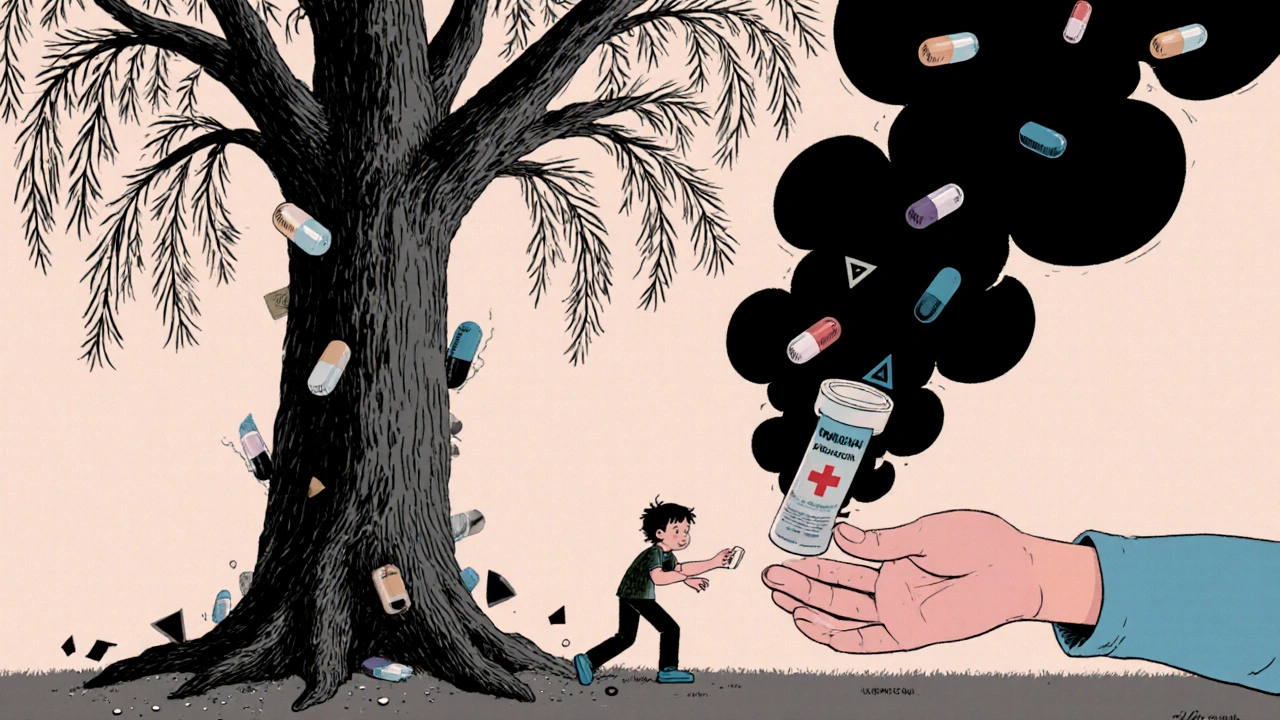
Choosing the Right Alternative for You
There’s no single best alternative to aspirin. It depends on what you’re treating and what your health risks are.
- For headaches or fever with a sensitive stomach: Paracetamol is safest.
- For joint pain, sprains, or menstrual cramps: Ibuprofen or naproxen work better.
- For long-term pain (like arthritis): Naproxen lasts longer; ibuprofen is easier to adjust.
- For heart attack prevention (if already at high risk): Aspirin is still recommended-but only under a doctor’s guidance.
- For children or teens: Never use aspirin. Use paracetamol or ibuprofen instead.
And here’s something most people don’t realize: mixing painkillers can be dangerous. Taking ibuprofen with aspirin can cancel out aspirin’s heart-protective effect. Taking paracetamol with alcohol increases liver damage risk. Always check labels. And if you’re on blood thinners, antidepressants, or steroids, talk to your pharmacist before switching.
When to See a Doctor
Don’t self-medicate if:
- You’re taking more than the recommended dose for more than 3 days
- You notice black stools, vomiting blood, or sudden dizziness
- You have unexplained bruising or bleeding gums
- You’re over 65 and taking any NSAID regularly
- You have kidney disease, liver disease, or asthma triggered by painkillers
These aren’t just side effects-they’re warning signs. A pharmacist can help you pick a safer option. A doctor can test for underlying causes of chronic pain.
Final Thoughts
Aspirin isn’t obsolete. But it’s not the default choice it used to be. For most people, it’s not the first-line option for pain or fever anymore. Paracetamol and ibuprofen are safer for everyday use. Naproxen has its place for longer-lasting relief. And for heart protection? Only if your doctor says so.
The real takeaway? Don’t assume aspirin is the best because it’s old or cheap. Your body, your health history, and your goals matter more. Ask questions. Read labels. And when in doubt, talk to someone who knows your full medical picture-not just the bottle on the shelf.
Is aspirin still good for preventing heart attacks?
Only for people who’ve already had a heart attack, stroke, or stent procedure. For healthy adults without prior heart disease, daily aspirin increases the risk of internal bleeding without offering clear protection. Major health organizations now advise against routine use for prevention in low-risk individuals.
Can I take ibuprofen instead of aspirin for heart protection?
No. Ibuprofen doesn’t have the same irreversible effect on platelets that aspirin does. That’s what makes aspirin unique for preventing blood clots. If you’re on low-dose aspirin for heart health, switching to ibuprofen removes that benefit. If you need pain relief, talk to your doctor about timing-some suggest taking ibuprofen at least 30 minutes after aspirin to avoid interference.
Why is paracetamol safer for kids than aspirin?
Aspirin use in children and teens with viral infections like flu or chickenpox can trigger Reye’s syndrome-a rare but life-threatening condition that causes swelling in the liver and brain. Paracetamol doesn’t carry this risk, which is why it’s the only recommended fever and pain reliever for kids under 18 in Australia and most other countries.
Does taking aspirin with food reduce stomach risks?
Taking aspirin with food or milk can help reduce mild stomach upset, but it doesn’t prevent ulcers or bleeding. The damage comes from aspirin blocking protective enzymes in the stomach lining-not just from direct contact. Enteric-coated tablets delay release until they pass the stomach, which helps a bit, but the risk remains. For long-term use, combining aspirin with a stomach-protecting drug like omeprazole is more effective.
Are herbal remedies like willow bark a good substitute for aspirin?
Willow bark contains salicin, which the body converts to salicylic acid-the same compound aspirin is made from. But the dose varies wildly between products, and there’s no standardization. You’d need to consume large amounts to match one aspirin tablet, increasing the risk of side effects like stomach irritation or allergic reactions. Plus, herbal products aren’t regulated like medicines. They can interact with other drugs and lack clinical proof for heart protection or fever reduction.
Can I switch from aspirin to naproxen for arthritis pain?
Yes, if your goal is pain relief from arthritis. Naproxen is more effective for long-term inflammatory pain than aspirin. But if you’re taking aspirin for heart protection, switching to naproxen removes that benefit. Talk to your doctor first. You might need to stay on low-dose aspirin and add naproxen only for flare-ups, or consider other options like physical therapy or topical NSAIDs.
What’s the safest painkiller for someone with high blood pressure?
Paracetamol is usually the safest choice. NSAIDs like ibuprofen and naproxen can raise blood pressure and interfere with blood pressure medications. Aspirin has a smaller effect on blood pressure, but it still carries bleeding risks. If you have hypertension and need regular pain relief, paracetamol is the first recommendation-unless your doctor advises otherwise based on your full medical history.
Always remember: painkillers aren’t harmless snacks. Even the ones sold over the counter can have serious consequences if used carelessly. The best choice isn’t the one with the lowest price tag-it’s the one that matches your body, your health history, and your needs.
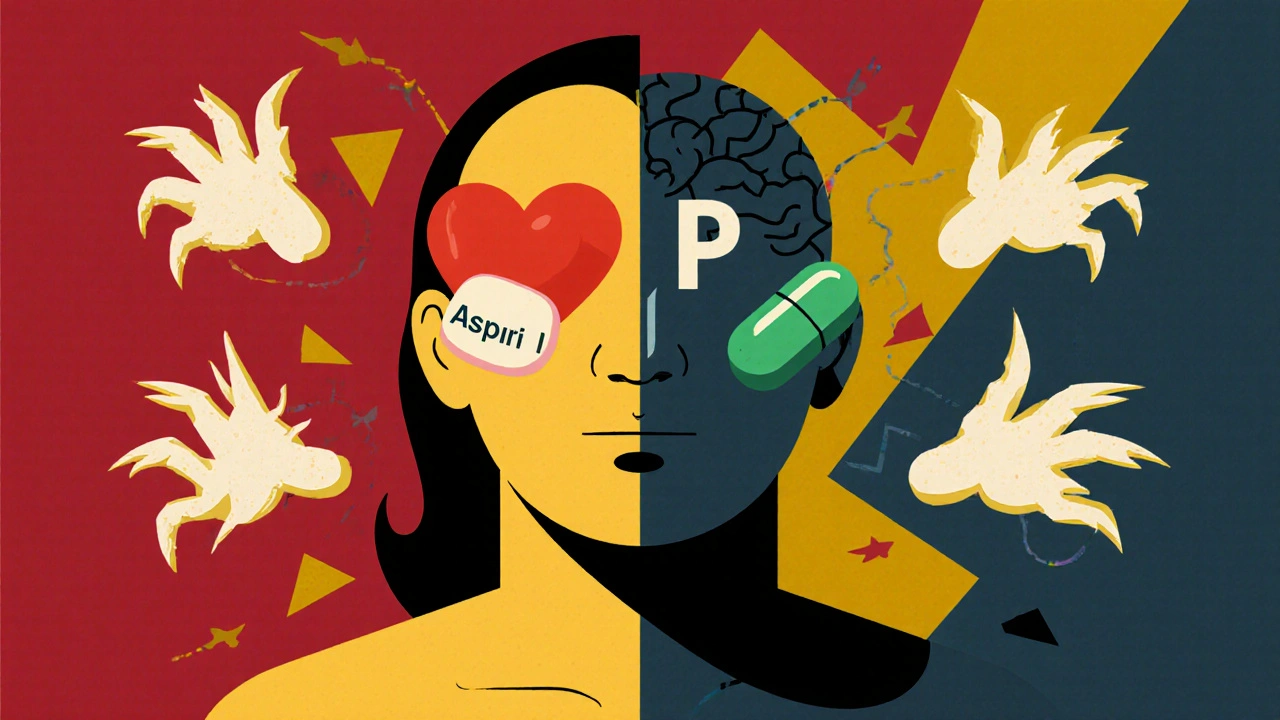

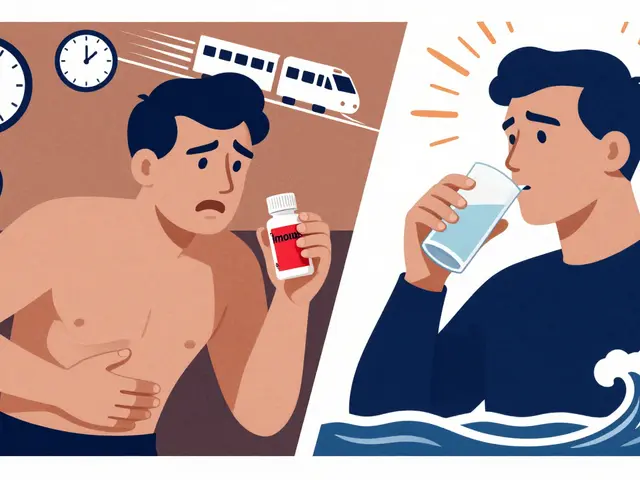
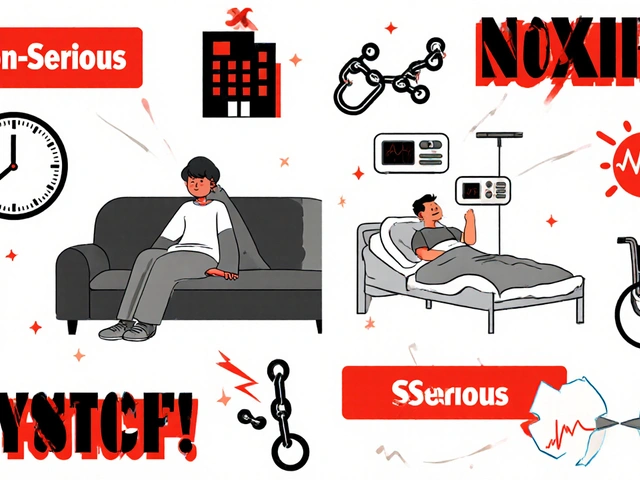
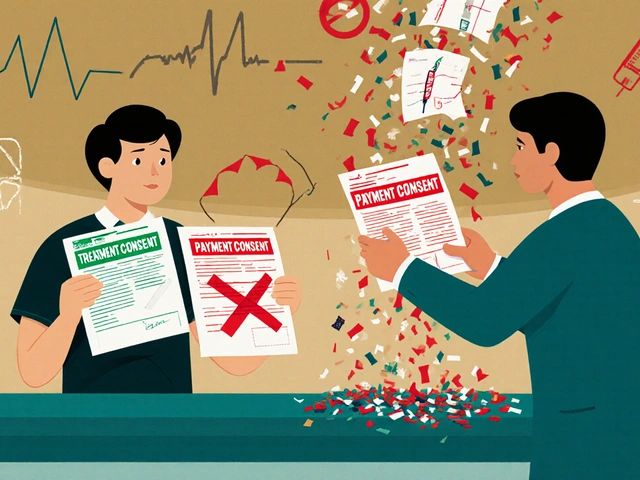
14 Comments
Christopher K-18 November 2025
Aspirin? More like aspirin-terrible. Who still uses this 19th-century relic? I took ibuprofen for my back pain last week and didn’t feel like I was swallowing ground glass. The fact that people still think aspirin is ‘cheap and effective’ is why America’s healthcare system is a dumpster fire.
harenee hanapi-19 November 2025
Oh my god I’m so glad someone finally said this. I’ve been telling my family for YEARS that paracetamol is the only safe option. My cousin’s kid got Reye’s syndrome because they gave him aspirin for a fever. He’s 22 now and still has cognitive issues. I swear, if you’re not using paracetamol for kids, you’re a monster. 😭
Christopher Robinson-20 November 2025
Big respect to the OP for laying this out so clearly. 🙌 I’m a nurse and I see people mixing NSAIDs with alcohol or blood thinners all the time. The labels aren’t always obvious, and pharmacists are overworked. Just take one painkiller at a time, check the ingredients, and if you’re unsure-ask. No shame in asking. Your liver will thank you. 💊❤️
James Ó Nuanáin-22 November 2025
It is an incontrovertible fact that the British National Health Service has long advocated paracetamol as first-line therapy for mild-to-moderate pain, precisely due to the negligible gastrointestinal risk profile. The American propensity for NSAID overuse is, frankly, a public health liability. One must consider the pharmacoeconomic burden of bleeding complications-far exceeding the cost of acetaminophen. This is not opinion. It is evidence-based medicine.
Nick Lesieur-22 November 2025
Wait… so you’re telling me I’ve been wasting my money on aspirin for heart health because I read it on a blog? LOL. I’ve been taking one a day since 2015. Guess I’m just lucky I haven’t bled out yet. 😅
Angela Gutschwager-22 November 2025
Aspirin for heart protection? Only if you’re already had a heart event. Period. Stop self-prescribing.
Andy Feltus-23 November 2025
It’s funny how we treat medicine like a menu. ‘I’ll have the aspirin with a side of willow bark and a turmeric latte.’ But the body doesn’t care about your Instagram wellness aesthetic. It cares about dosage, mechanism, and risk. We’ve outsourced medical literacy to influencers and Amazon reviews. That’s not progress. That’s a tragedy wrapped in a reusable tote bag.
Dion Hetemi-23 November 2025
Let’s be real-nobody reads the label. I’ve seen people take 3 Advil, 2 Tylenol, and a baby aspirin because ‘they all work differently.’ Then they show up in the ER with a liver enzyme count that looks like a stock market crash. This post is great, but it’s like handing a flamethrower to a toddler and saying ‘be careful.’ Most people won’t listen. They’ll just Google ‘best painkiller Reddit’ and pick the one with the most upvotes.
Kara Binning-24 November 2025
I’m so angry right now. My dad took aspirin daily for 10 years because his friend said it was ‘good for circulation.’ He had a GI bleed in the middle of the night. We almost lost him. Now he’s on omeprazole, paracetamol, and a lifetime of guilt. And the worst part? He didn’t even know it was dangerous. How many more people are out there doing this?!
river weiss-25 November 2025
It is essential to recognize that the pharmacological profiles of NSAIDs vary significantly in terms of platelet inhibition, renal effects, and gastric mucosal penetration. Aspirin’s irreversible acetylation of COX-1 confers unique antithrombotic properties not replicated by ibuprofen or naproxen. Consequently, substitution without medical supervision may compromise cardiovascular protection in high-risk patients. Always consult a physician prior to altering antiplatelet regimens.
Brian Rono-26 November 2025
Paracetamol is the ‘safe’ option? Please. It’s the silent killer. Liver failure doesn’t come with a warning label-it comes with a 3 a.m. 911 call and a corpse. Meanwhile, aspirin’s stomach risks are well-documented, predictable, and manageable. You want safety? Take the drug you understand, not the one that sounds like a yoga retreat. And for the love of God, stop romanticizing ‘natural’ remedies. Willow bark is not a ‘holistic alternative.’ It’s a poorly dosed poison with a cult following.
Zac Gray-28 November 2025
I get why people reach for aspirin-it’s cheap, it’s been around forever, and it feels like a ritual. But here’s the thing: medicine isn’t about tradition. It’s about matching the tool to the job. If you’ve got a sprained ankle? Ibuprofen. Fever in a kid? Paracetamol. Heart protection? Only if your doctor says so. And if you’re taking three different OTC meds because you ‘don’t know which one works’? That’s not being resourceful. That’s playing Russian roulette with your organs. Take a breath. Read the label. Talk to a pharmacist. You’re not being weak-you’re being smart.
seamus moginie-28 November 2025
While I appreciate the clinical precision of this exposition, I must register my dissent: the assertion that aspirin is obsolete for pain management is a gross oversimplification. In my clinical practice in rural Ireland, where access to specialists is scarce and pharmaceutical costs are prohibitive, aspirin remains a vital, accessible, and empirically reliable agent for the mitigation of low-grade inflammatory pain. To discard it wholesale, particularly among elderly populations with fixed incomes, is not merely imprudent-it is ethically negligent. The evidence may shift, but human need does not.
Steve and Charlie Maidment-29 November 2025
Yeah, but what about the fact that the FDA doesn’t regulate herbal supplements like they do pills? So if you buy willow bark off Amazon, you could be getting anything-dust, sawdust, or worse, actual aspirin without knowing it. I once bought ‘natural pain relief’ and ended up with stomach bleeding because the bottle had 81mg of acetylsalicylic acid in it. No warning. No label. Just ‘herbal magic.’ So now I just buy the real stuff. At least I know what I’m swallowing.